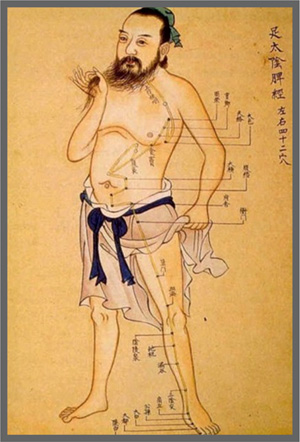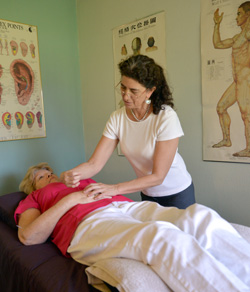Acupuncture
What is Acupuncture?
 Acupuncture is an effective form of medical treatment and a complete holistic care system. It involves the insertion of very fine, hair-thin needles into acupuncture points on the body. Our acupuncturist trained for years to be able to choose and combine the right points based on the patient’s needs, while also taking into account the patient’s underlying constitution.
Acupuncture is an effective form of medical treatment and a complete holistic care system. It involves the insertion of very fine, hair-thin needles into acupuncture points on the body. Our acupuncturist trained for years to be able to choose and combine the right points based on the patient’s needs, while also taking into account the patient’s underlying constitution.
Acupuncture is a very ancient form of medicine which developed in China over 2000 years ago. It has evolved over the years and continues to develop through modern scientific research, but the medicine maintains it’s original concepts and ideas about how the body works.
 At the core of Chinese medicine and acupuncture is the concept of qi (pronounced “chee”). Qi, which is usually translated as Life Force Energy, travels through the body along meridians, just like blood travels through the body in blood vessels. There are multiple types of qi in the body, although qi is generally referred to as a single unit. Qi is responsible for your immune system, metabolism, energy, sexual health, and the proper functioning of your muscles, organs, and senses.
At the core of Chinese medicine and acupuncture is the concept of qi (pronounced “chee”). Qi, which is usually translated as Life Force Energy, travels through the body along meridians, just like blood travels through the body in blood vessels. There are multiple types of qi in the body, although qi is generally referred to as a single unit. Qi is responsible for your immune system, metabolism, energy, sexual health, and the proper functioning of your muscles, organs, and senses.
The ancient Chinese imagined the body to have a geography similar to what they saw in nature. The flow of qi was thought to mirror the flow of water in the world. Meridians are the rivers of qi. This river of energy flows in a circuit around the body, diving deep inside to surround and penetrate the organs, and surfacing along the skin. Some meridians are actually internal “seas,” storing qi and releasing it at times when the body is taxed beyond normal.
 The ancient Chinese divided the meridians into sections and named each section after an organ. Even though qi actually moves smoothly through the whole circuit acupuncturists still use the organ names for the various sections of the pathway. You will hear your acupuncturist mention the “Spleen” meridian, or the “Gall Bladder” meridian, etc., but rest assured this has nothing to do with your real spleen or gall bladder – they are simply references to a section of the pathways of qi.
The ancient Chinese divided the meridians into sections and named each section after an organ. Even though qi actually moves smoothly through the whole circuit acupuncturists still use the organ names for the various sections of the pathway. You will hear your acupuncturist mention the “Spleen” meridian, or the “Gall Bladder” meridian, etc., but rest assured this has nothing to do with your real spleen or gall bladder – they are simply references to a section of the pathways of qi.
When qi is abundant and flowing smoothly a person experiences health and good energy. When qi declines or becomes “stagnant” the person experiences fatigue, stress, pain or disease. Acupuncture relieves pain and returns a person to health by alleviating stagnations and helping to build qi when it is deficient. However, the primary way to build qi is through healthy living – eating well, exercising regularly, limiting sugars and alcohol, and maintaining a calm emotional state.
This is why acupuncturists frequently sound like life coaches – we teach people that they can take an active role in their health through habits that will change the quality and amount of qi in their bodies.
Many people see acupuncturists even when there is nothing wrong. Monthly or quarterly trips to the acupuncturist can help maintain good health and prevent problems before they start.
Western medicine uses drugs to balance the body’s chemistry; Chinese medicine uses acu-points to balance the body’s energetic flow.
Myths & Truths About Acupuncture
M: Acupuncture has no scientific basis.
T: For a long time, this was true. Because the Chinese view of the body was so radically different from the Western view, it was hard for medical researchers to apply the scientific method to studies of acupuncture. In 1995 WHO (World Health Organization) published a set of research guidelines for this field, and numerous studies have since proven the effectiveness of Chinese medicine for a wide range of conditions.
M: One treatment is all it takes.
T: Acupuncture is a form of medicine, not a “magic bullet”. While symptomatic relief may be immediate and last for several hours to several days, in general, a series of treatments will be necessary to control the complaint. One rule of thumb is that the longer the patient has had the problem, the more treatments will be required. If you feel you should be getting different results, talk to your acupuncturist. Chinese Medicine works best with an honest give and take between practitioner and patient.
M: I’ve been told there’s nothing wrong with me, but I know there is. Can acupuncture help?
T: Definitely! Acupuncture, and Chinese Medicine overall, operates from a completely different paradigm than Western medicine. If Western medicine is at a dead-end, i.e., your doctor has said there is nothing more he or she can do, or he can’t find anything physically wrong with you and that “it’s all in your head”, frequently Chinese medicine’s unique approach can provide new avenues for help.
M: There’s nothing wrong with me except stress!
T: Due to the unique understanding that the ancient Chinese brings to the mind-body connection, acupuncture and herbs can be very effective in reducing stress, tempering difficult emotions, and providing support when life situations cause emotions that are “out-of-control”. Assessing a patient’s emotional state is part of standard intake procedure.
M: Doesn’t acupuncture hurt?
T: Acupuncture needles are extremely thin. Upon insertion, the patient can feel a prick similar to an insect bite, or feels nothing. Within one to two breaths, sensation can range from nothing at all to heaviness to a sensation known as ‘da qi’, an electric-like feeling of energy moving through the body. The feelings generated can be so relaxing that many patients fall asleep.
M: Acupuncture is only good for pain.
T: Acupuncture gained popularity because of its effectiveness for pain, but it is increasingly being demonstrated that it works on many other issues as well. Fatigue, anxiety and insomnia are all common in our society, and all can respond to acupuncture, even where medications have failed. Women’s health issues like menopause, PMS, and infertility are good candidates for treatment by acupuncture. Digestive complaints like sluggishness, chronic loose stool, constipation, heartburn, gassiness, bloating, GERD and combinations of these also respond very well to acupuncture.
